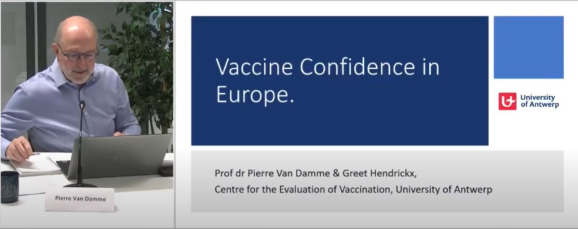STRONGER TOGETHER: EU-FUNDED VACCINATION
PROJECTS JOIN FORCES TO BOOST SUPPORT
FOR HEALTHCARE PROFESSIONALS | COLLABORATION IS THE ANSWER TO MORE EFFICIENT,
STREAMLINED COMMUNICATION ON VACCINES | Various EU-funded projects on vaccination are running in parallel in Europe, providing materials, training, and workshops to support healthcare professionals to communicate with confidence about vaccines and vaccination. With many projects vying for their attention, healthcare professionals might find it difficult to know where to look for trustworthy information, or feel overwhelmed by the amount of available content.
IMMUNION partners acknowledged this risk and came up with a solution to streamline activities across the different initiatives. You can read all about it on our website here. | | | KNOWLEDGE IS POWER: IMMUNION IDENTIFIES COMMUNICATION TOOLS TO HELP INCREASE VACCINE UPTAKE IN 4 EU COUNTRIES | | A GREAT SELECTION OF VACCINE COMMUNICATION TOOLS IS MADE AVAILABLE VIA THE COALITION FOR VACCINATION WEBSITE | One of our project’s key objectives is developing communication and community engagement tools that will contribute to increasing vaccine uptake in four partner countries: Greece, Italy, Latvia, and Romania. To do that, we had to get to the root of the problem and identify what causes vaccine hesitancy in the first place in these countries.
Based on these results, we gathered, selected, and made available a variety of resources from across the four EU countries, all of which you can find here. The toolbox also includes some English-language resources developed by international projects and organisations. Find out more about how we built the toolbox here. | | | IMMUNION HOSTS “TRAIN THE TRAINER” EVENT TO BOOST VACCINE CONFIDENCE | | ALL 66 PARTICIPANTS IN THE EVENT NOW FEEL MORE CONFIDENT ABOUT DISCUSSING VACCINATIONS WITH PATIENTS AND PARENTS | IMMUNION focuses on providing support to current and future healthcare providers on how to highlight the importance of vaccination in their conversations with patients and their families. According to a recent survey, 89% of healthcare professionals would be willing to go through further training on vaccine communication, should it be provided, which tells us that we are on the right path.
On June 21, 2022, IMMUNION partner, the University of Antwerp, organised an online event for trainers of healthcare providers or of healthcare students from across Europe. The training covered topics such as health literacy, good practices in vaccine communication, and tips and tricks on how to communicate more fluently on the benefits of vaccination. Read more about how the event went on our website and watch the recording here. |  | | | WHY VACCINE UPTAKE IS LOWER IN EASTERN EUROPE - AND WAYS TO REVERSE THIS TREND, ACCORDING TO NURSING LEADERS | | INSTITUTIONAL SUPPORT IS NEEDED TO INCREASE VACCINE TRUST | Why did countries in Central and Eastern Europe experience a lower vaccine uptake than their Western counterparts? What are the potential causes of vaccine reluctance in these countries and what can be done to improve the numbers in the future?
From how to address misinformation to how to support healthcare professionals in explaining the benefits of vaccination (and why a project like IMMUNION is very efficient in this regard), nursing leaders from the region shared their opinions with the European Federation of Nurses Associations and called for a consistent joint effort to tackle these issues. You can read the article here. | | VACCINES NEWS BY IMMUNION PARTNER EURACTIV POLAND
UNICEF EXECUTIVE DIRECTOR CATHERINE RUSSELL:
“GAPS IN GLOBAL IMMUNISATION COVERAGE ARE GAPS VULNERABLE CHILDREN CANNOT AFFORD” |  | One of the consequences of the COVID-19 pandemic was the weakening of immunisation efforts in some of the world’s regions. As such, millions of children in countries with particularly low access to vaccines are now at risk of developing contagious, vaccine- preventable diseases, warns UNICEF.
Together with its partners, UNICEF is doubling their efforts to vaccinate the so-called “zero- dose children” in vulnerable areas across the world - and the EU is a great ally in this mission.
Find out more in the news piece by Aleksandra Krzysztoszek from EURACTIV Poland. | | | |